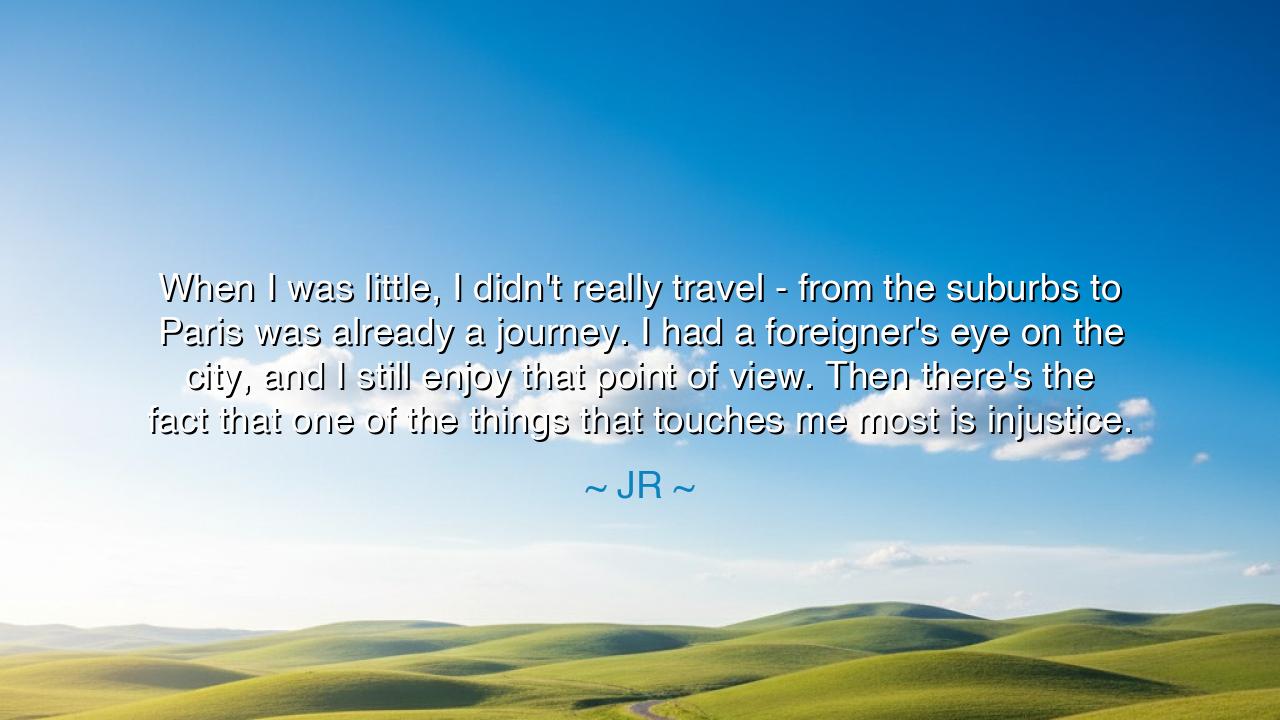
When I was little, I didn't really travel - from the suburbs to
When I was little, I didn't really travel - from the suburbs to Paris was already a journey. I had a foreigner's eye on the city, and I still enjoy that point of view. Then there's the fact that one of the things that touches me most is injustice.






In the words of the artist JR, we hear both the memory of childhood and the fire of conscience: “When I was little, I didn’t really travel—from the suburbs to Paris was already a journey. I had a foreigner’s eye on the city, and I still enjoy that point of view. Then there’s the fact that one of the things that touches me most is injustice.” These words, spoken humbly, reveal the birth of an artist’s vision: that to see the world as if one is a stranger is to truly perceive it, and to feel its injustices with raw clarity is to be compelled to act.
To say that moving from the suburbs to Paris was a journey is to remind us that travel is not measured in miles but in transformation. For a child, the crossing of a small distance can feel like entry into another world. What to others was ordinary—the great boulevards, the crowded streets—was to him the marvel of another land. This early sense of wonder, born not of oceans crossed but of a city discovered, laid the foundation of his art. For the greatest artists are those who retain the child’s ability to be astonished by what others ignore.
The foreigner’s eye is a gift. It is the eye that does not take things for granted, that sees the cracks in the walls and the beauty in the shadows. The native, accustomed to what surrounds them, often becomes blind; the foreigner, unaccustomed, sees clearly. JR claims this perspective not as a curse but as a source of joy, for to him, the city remains strange, alive, demanding attention. This is the perspective that gives birth to art: not the complacency of familiarity, but the fire of curiosity.
Yet this seeing is not only about beauty—it is also about injustice. To have the foreigner’s eye is to notice what others overlook: the poverty behind the glamour, the exclusion behind the spectacle, the pain behind the façade. JR declares that it is injustice which touches him most deeply, as if his vision cannot help but pierce the veil of indifference. This sensitivity is the burden of the artist, the prophet, the reformer: to see what others refuse to see, and to be moved by it.
History offers us many who shared this gift. Consider Charles Dickens, who walked the streets of London not with the eyes of a gentleman blind to poverty, but with the gaze of one who could not ignore the suffering of children in the factories. Out of that gaze came stories that pricked the conscience of a nation. Or consider Victor Hugo, who, wandering Paris, saw both the splendor of cathedrals and the misery of the poor, and so wrote Les Misérables, a cry for compassion and justice. Like them, JR reminds us that the act of seeing clearly is itself revolutionary.
To view one’s own city with a foreigner’s eye is to be both insider and outsider—to belong, yet to question, to love, yet to criticize. This tension is the seed of creation. For the one who never questions becomes complacent, and the one who never belongs becomes rootless. But to hold both—to live within and yet look from without—creates the possibility of new vision, new art, new truth.
The lesson is clear: never let your eyes grow dull to the world around you. Whether you travel across continents or only across the street, keep the foreigner’s gaze alive within you. Notice what others dismiss. Feel the weight of injustice, and do not harden yourself against it. Let what you see move you to speak, to create, to act. For in every suburb there is a Paris to be discovered, and in every city there is truth hidden beneath the surface.
So I say to you: live with eyes awake. Let every place you walk be a journey. Carry within you always the foreigner’s eye—the eye that marvels, the eye that questions, the eye that refuses to be blind. And when injustice pierces your vision, do not turn away. For it is in seeing clearly, and in acting boldly upon what you see, that you become not only a traveler through the world, but a maker of change within it.






AAdministratorAdministrator
Welcome, honored guests. Please leave a comment, we will respond soon